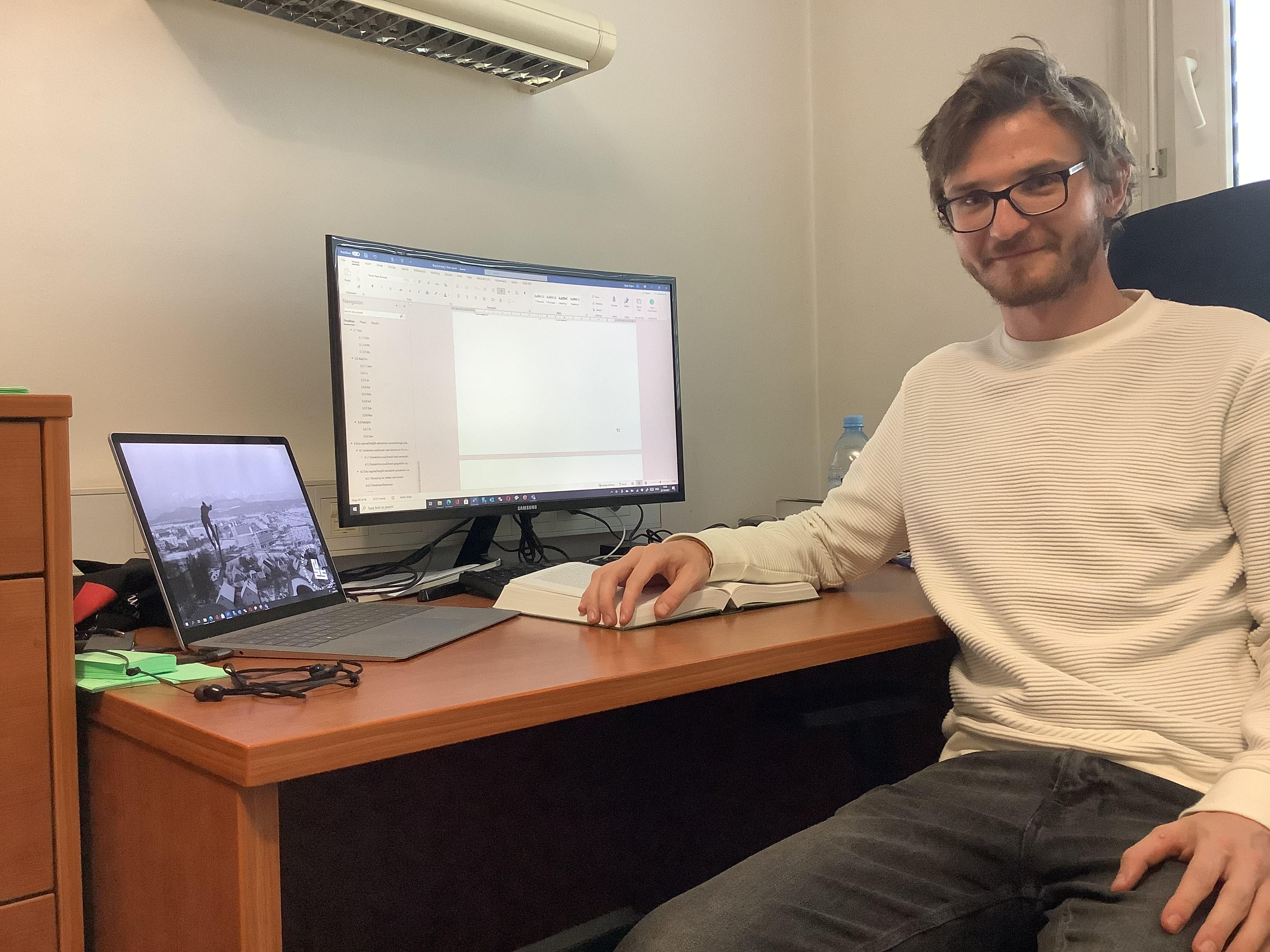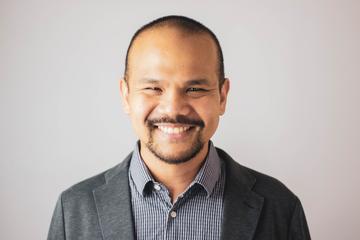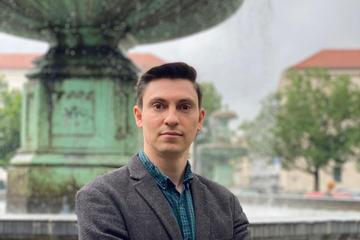
By Heather Walker
Lay Centre alumnus, Aljaž Krajnc completed his Licenciate at the Pontifical Institute for Arabic and Islamic Studies in June 2020, despite the difficulties posed by the pandemic. In this interview he talks about his doctoral studies and the unique opportunity to do a joint doctorate with the University of Ljubljana and PISAI in Rome.
Since being awarded your licentiate at the Pontifical Institute for Arabic and Islamic Studies in June 2020, you returned to your native Slovenia. What you have been up to this past year?
I started my PhD in Christian theology in the faculty of theology of the University of Ljubljana, Slovenia’s largest university, and I successfully completed the first year. I prepared my thesis project mainly, and I took some obligatory exams. My thesis focuses on how the Qur’an deals with Jewish and Christian notions of God’s kingship. Therefore, my research this past year focused on Jewish and Christian primary and secondary sources, in order to obtain a solid understanding on how Jews and Christians interpreted God’s kingship during the first centuries A.D.
Tell us about the PhD you are about to start, which is a joint doctorate with the University of Ljubljana and PISAI in Rome.
Since my previous training includes a bachelor’s degree in Christian theology and religious studies and a licentiate in Islamic and Arabic studies, I thought to combine both of my research fields and write one interdisciplinary thesis. A joint doctorate allows a student to do this. A student is then supervised by two academic institutions that have slightly different areas of expertise. The joint doctorate requires I demonstrate that I am sufficiently qualified to obtain a doctorate in the two fields in which I am working. At the same time, I have to successfully combine the findings in each field to produce knowledge that could not have been produced by concentrating on one of these fields alone.
The study of the Qur’an can offer precious information to scholars who study the reception of the Bible during the first centuries A.D. Likewise, the study of the reception of the Bible can offer Qur’anic scholars valuable information about the context in which the Qur’an emerged. This approach is in fact encouraged in the Qur’an, which refers to Jewish and Christian tradition numerous times and presents itself as belonging to the same history of revelation. I am grateful both universities are giving me a lot of support and encouragement.
How did this agreement for a joint doctorate come about and how significant is this for you?
During the last year of my licentiate in Rome, I had to decide whether to continue with my PhD in Rome or in Slovenia. After speaking with professors at both institutions, I realized it was possible to enter a joint doctorate and to continue studying at both institutions simultaneously. Both institutions were supportive of such an agreement. Last year, I completed the first year of my PhD in Ljubljana and this year I officially started with the joint doctorate and began with my doctoral studies at PISAI. This agreement allows me to have my thesis supervised by specialists in Biblical and Qur’anic studies and that means the most to me.
What is the title of your thesis and its main topics, and why is this particular subject of interest to you?
The title of my thesis is “The Semantic Field of God’s Kingship in the Qur’an and its Biblical Context.” Although it sounds a bit abstract, it can be explained quite easily. The Qur’an sometimes refers to God as “king,” or “malik” in Arabic, and many times attributes some other word derived from the Arabic root “m-l-k” to God. The root m-l-k could be translated in various ways, but its basic meaning is to possess something or to rule over someone. It is frequently used to describe what could be rendered best as “king.” This root is used in Biblical Hebrew to describe God and appears also in other Semitic languages. When the Qur’an ascribes it to God, it refers to God as Jewish and Christian writings would. The fact that I am studying the semantic field of God’s kingship in the Qur’an means I am attentive not only to the use of the root m-l-k, but also to other terms that appear in conjunction with it and are part of the context of the king’s court, such as the throne on which the king is seated and the king’s right to judge or to send a messenger.
If one takes into account the whole semantic field of God’s kingship in the Qur’an, one can at least partially reconstruct the theological worldview of the Qur’an and how it refers to Biblical tradition. One can determine what the Qur’an wanted to tell its audience and in which ways it criticized Christian and Jewish theological premises.
This subject interests me because I think it manages to explain what was at the core of early Islamic theology and the expansion of Islam. I think it was the conviction that God is king and, therefore, no other human monarch was worthy to hold this title. This fits quite well in the context of early Islamic history. I think it is not a coincidence that the first leaders of the Islamic community, that is, the so-called caliphs, did not bear the title “king” and that one of the most important among them was called “The servant of the King” (‘Abd al-Malik).
As well, as a Christian, I also encounter the figure of God the king in my own religious tradition. Just think of how many frescoes depict Jesus as the eschatological king who will judge the world. And when we read the Passion narratives in the Gospels, isn’t one of the most important questions about who is the true king? Wasn’t Jesus also preaching the kingdom of God? And doesn’t the Book of Revelation depict Christ as enthroned? Wasn’t the prophet Isaiah speaking about the servant of God and didn’t he also address God as king? These are all the questions that I am asking myself as a believing Christian.
What are your plans post-PhD?
I would like to continue with academic research because I think good and independent academic scholarship is key to addressing the challenges of interreligious dialogue, especially Muslim-Christian dialogue, where it is important to know each other in an integral way. I think that is how human relationships work. Engaging in dialogue with someone from another religion should involve knowing not only what we agree upon but also what has happened in history that divides us, the fears believers bring with them to the dialogue, and how the negative parts of our history influence us today. Ultimately, being friends with our Muslim sisters and brothers means that — with all of the positive and negative aspects of the history we share — we still choose dialogue and life with each other. This very decision is a most precious achievement of interreligious dialogue and it is what enables Muslim-Christian dialogue to occur. It is a way for us to witness to how God’s mercy is bestowed upon all of us. Mercy is also closely linked with kingship because a king is one who can show mercy. Mercy is a crucial concept in Islam, Judaism and Christianity. So my post-PhD plans are to continue to work in the field of Muslim-Christian dialogue and to carry out research on Muslim, Christian and Jewish theologies throughout history.
Photo courtesy Aljaž Krajnc


